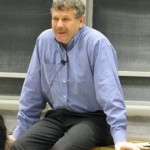 Contrary to his teddy bear looks, pioneering scientist Eric Schadt (pronounced “shot”) engages in battle every day at work. In a laudatory feature in Esquire, Schadt relates how the book The Structure of Scientific Revolutions by Thomas Kuhn influenced the way he thinks about violence in his career.
Contrary to his teddy bear looks, pioneering scientist Eric Schadt (pronounced “shot”) engages in battle every day at work. In a laudatory feature in Esquire, Schadt relates how the book The Structure of Scientific Revolutions by Thomas Kuhn influenced the way he thinks about violence in his career.
Initially published in 1962, Kuhn coined the term “paradigm shift,” which captures the essence of Dr. Schadt’s current endeavors. From Esquire:
According to Kuhn, scientific progress is not a peaceful process, characterized by the gradual accumulation of knowledge. Rather, it’s a nearly political one, characterized by acts of intellectual violence. A paradigm is like a king — it’s the body of knowledge and practice that coheres around a theory or a discovery, and in periods of stability everybody serves it by practicing what Kuhn calls “normal science.” Eventually, though, it becomes insufficient to its own ends and enters a period of crisis, during which it comes under attack by those practicing “extraordinary science.” At last, the king is overthrown, and that’s a paradigm shift.
Schadt, who practices extraordinary science as the Chief Scientific Officer at Pacific Biosciences, says, “I remember the exact month, almost the exact day I started reading that. It was when I first started graduate school in 1993.”
The article continues:
A paradigm shift requires not only scientists practicing extraordinary science; it requires “attackers” and “persuaders” willing to declaim the end of the old order and announce the dawn of the new. Schadt has turned out to be both. He’s very aware that biology is in the middle of a paradigm shift and very aware of his role in both the murder of molecular biology — the king is dead! — and the establishment of its successor. He’s even produced a documentary film entitled The New Biology, which heralds the arrival of a biology that’s “more like physics” and “more quantitative in nature” than biology has ever been.
Did you catch that? To recap: 1. The discipline of biology–the study of life itself–is being decimated and rebuilt as we speak. And 2. Eric Schadt is forging the path to the New Biology. Indeed his star is rising.
So the genomics guru commits all kinds of violence at work. And so do you.
Aggression is part of our human makeup, and manifests in the workplace in many ways. It can take the form of discrediting a colleague, interrupting someone, taking credit where it’s not due, not doing as you’re told, disregarding rules, withholding data, the list goes on. Some of these behaviors are ultimately destructive, others absolutely creative.
Schadt channels his intellectual aggression creatively: into shifting the discipline of biology from the study of one gene at a time towards studying networks of genes simultaneously. His related contributions to the world are pretty astounding.
We consider this life-affirming violence.
How does aggression show up in your work? And what’s its impact?
Image via




Pingback: Become an Expert in Your Field | Whole Wide Work
In the living creature the body (cell) is working as a holistic entity. This means, a gene is reacting to the whole network!